- Home
- Kathy Reichs
Virals tb-1
Virals tb-1 Read online
Virals
( Tory Brennan - 1 )
Kathy Reichs
Tory Brennan, niece of acclaimed forensic anthropologist Temperance Brennan (of the Bones novels and hit TV show), is the leader of a ragtag band of teenage "sci-philes" who live on a secluded island off the coast of South Carolina. When the group rescues a dog caged for medical testing on a nearby island, they are exposed to an experimental strain of canine parvovirus that changes their lives forever. As the friends discover their heightened senses and animal-quick reflexes, they must combine their scientific curiosity with their newfound physical gifts to solve a cold-case murder that has suddenly become very hot-if they can stay alive long enough to catch the killer's scent. Fortunately, they are now more than friends: They are a pack. They are Virals.
This book is dedicated to the good people and dogs of Charleston.
Thanks for welcoming me to the neighborhood!
PROLOGUE
A gunshot is the loudest sound in the universe.
Especially if the bullet is coming at you.
Crack! Crack!
Bullets slashed the forest canopy. Overhead, monkeys screeched and scattered.
Down below, I ran.
Heedless, legs hammering, I pounded through the undergrowth. Mind blank. Terrified.
Find the path!
Shapes zoomed by in the black. Trees. Bushes. Startled creatures. Gun-toting killers? I couldn’t tell. Heart thumping, I barreled forward in a dead sprint. Blind.
A root snagged my foot and down I went. Pain detonated in my leg.
Get up! Get up! Get up!
Something large zipped past in the darkness. I froze.
“Ben?!?!”
No reply. Sudden stillness.
Waiting here means death. Move!
Scrambling to my feet, I bolted into the night.
Was Hi up ahead? Shelton had gone left, darting into the foliage.
Please be Ben that ran by me!
We hadn’t had a plan. Why would we? No one knew we were here, or what we were doing.
Who the hell is trying to shoot me?
Exhausted, I gulped air.
Later, after the change, I could have run forever. Fast. Tireless. My perfect vision piercing the night’s shadows. Not gasping, lost in the shapeless dark.
These thugs wouldn’t have stood a chance, whoever they were. Not with our powers unleashed. My pack would have savaged them. Planned without speaking a word. Stalked them like they were kittens. Then taken out the trash.
But not that night. I was in trouble. Fading. Scared shitless.
So I ran. Hard. Branches clawed my limbs and ripped my skin. Finally, I hit open space.
The beach! I was close.
A voice hissed from the void.
“Tory! Over here!”
Shelton.
Thank God.
In the starlight, I could just make out the boat. Vaulting the railing, I dropped into the bow and turned to scan the shoreline. Clear. For the moment.
“Where’s Hi? Ben?” I whispered, panting, sweat-drenched. I was definitely on tilt.
“I’m here.” Ben eased from the darkness. A quick bound and he was in, sliding behind the controls. Keys in hand, he paused, afraid to turn the engine. Afraid not to.
Hi was still out there.
We sat, tensed, waiting. My courage leaked from my shoes.
Come on, Hi. Show. Please, oh please, oh please, oh please . . .
PART ONE:
ISLANDS
CHAPTER 1
The whole thing started with a dog tag. Well, a monkey with a dog tag. Take your pick. I should have known it would be trouble. Should have sensed it. But I wasn’t as perceptive then. I hadn’t evolved. Yet.
Wait.
I’m getting ahead of myself.
It was a typical Saturday morning at home, though my home is anything but typical. It’s unique—bizarre even. Which means I fit right in.
There are lots of interesting things about where I live, if you like the outdoors as much as I do. Not a nature lover? You might find my hood a bit . . . out of touch.
Because I live on a deserted island. Well, a pretty empty one, anyway.
Morris Island. My home away from normal homes. The end of the line. Nowheresville. The back-ass of Charleston. It’s not so bad, if you aren’t prone to loneliness. Which I am, but whatever. I’ve come to appreciate the legroom.
Morris isn’t imposing, as islands go, only four square miles. The northern half is an unremarkable strip of rolling, sandy hillocks. Then, in the middle, sand hills rise thirty-to-forty feet, marching south as the island widens. The western reach consists of dense marshland bordered by shallow tidal bays. To the east, the boundless Atlantic Ocean.
Dunes, swamps, beaches. And quiet. Plenty of quiet.
Only two modern structures exist on our teeny little landmass. One is the complex in which I live; the other is a road. The road. Our only connector to the outside world. It’s a one-lane, unmarked, narrow strip of pavement that winds south through dunes and marshes before leaving Morris and crossing Lighthouse Creek to Rat Island. Eventually the blacktop meets the highway at Folly Beach, then passes Goat Island on the way into the city.
Rat. Goat. Folly. You’ll have to ask the Charleston Historical Society who picked such delightful names. There are dozens more.
It was all new to me. The year before, I’d never been south of Pennsylvania. Then I crashed into my dad’s life.
About my “roommate” . . .
Christopher “Kit” Howard is my father. Kit and I have known that fact for exactly six months. That’s when I moved to South Carolina to live with him.
I had no choice, after what happened to Mom.
After the accident.
I’m not sure why, but Mom never told Kit about me. He had no idea he was a father. Had been one, in fact, for the last fourteen years.
Kit’s still not over the shock. I see it on his face every now and then. He’ll wake from a nap, or come up for air after a long stretch of work, and literally jump when he notices me. I see it register: That’s my daughter. I have a daughter who is fourteen and lives with me. I’m her father.
Same shock for me, Pops. I’m working through it, too.
How do I describe my newfound dad? Kit is thirty-one, a marine biologist and research professor at the institute on Loggerhead. A workaholic.
He’s also a clueless parent.
Maybe it’s all too new—you know, the astonishment of learning you have a half-grown kid. Or maybe Kit remembers his own wild youth. In any case, he has no idea what to do with me. One day he chats me up like one of his buddies, and the next he treats me like a child.
To be honest, I own my share of the blame for things being sticky. I’m no saint. And I’m just as lost about having a father.
So here we are. Together. Smack dab in the middle of nowhere.
That day, I was classifying seashells by species. Corny? Maybe. But I’m a science nut. I live for figuring things out, finding answers. Mom always joked that it was hard raising a kid who was smarter than most college professors.
My take? I just do what I do.
Piles of shells littered the kitchen table. Sundials. Shark’s Eyes. Turkey Wings. Recently cleaned and buffed, they gleamed in the early morning sunlight.
I removed a new specimen from the bucket at my feet, making sure not to dribble bleach-water onto my clothes. It was a Scotch Bonnet, easily recognizable: white, egg-shaped, with red and brown spots circling its grooved outer surface. Pleased with the rare find, I set it aside to dry.
Reach. Pull.
My next draw was a mystery. Ark? Cockle? Both clams are abundant on the South Carolina coast.
Despite having soaked in bleach for almost t
wo hours, the shell’s exterior was covered with caked-on debris. Barnacles and encrusted silt obscured all detail.
Excellent. I’d been looking for an excuse to use my power tools. They were a gift from my great-aunt Tempe.
You may have heard of her.
I was shocked when I found out. I’m related to Dr. Temperance Brennan, the world famous forensic anthropologist. She’s kind of my idol. When Kit first told me, I didn’t believe him, but his story checked out. Tempe’s sister, Harry, is my grandmother.
So there’s a celebrity in my family. A renowned scientist. Who knew?
Okay, at that point I’d only met Aunt Tempe once. But that wasn’t her fault. After all, like Kit, she’d only known of my existence for six months.
Aunt Tempe’s job is pretty intense. She identifies corpses. Seriously. A dead body might be burned, or decomposed, or mummified. It could be maggot city, or just a skeleton. Doesn’t matter. Aunt Tempe determines who the person is. Was. Then she and the cops try to figure out what happened to them.
Not bad, if you’ve got a steady stomach. I think I do.
Learning about my aunt helped me understand myself. Why I have to answer every question, solve every riddle. Why I’d rather read about fossilized raptors or global warming than go shopping for handbags.
I can’t help it. It’s in my DNA.
Aunt Tempe’s specialty is teasing facts from bones. What better way to use her gift than to clean dead mollusk shells?
That’s all shells are, anyway. Bones.
Digging a Dremel cordless rotary tool from my kit, I attached the bristle brush head and gently abraded the encrustations on the shell’s surface. After a few moments I switched to a sanding drumhead to remove more dirt.
Once the larger barnacles were gone, I grabbed my Neytech micro sandblaster, hooked its line to a small air compressor, and delicately bathed the seashell with aluminum oxide sand. Next, I used a dental pick to scrape off the final pesky particles. After washing away the remaining grit with a Water Pik, I went back to the rotary tool, this time with the polishing head. Done.
The shell glistened on the table before me. A spotted tan oval with a purplish interior. Four inches long. Prominent radial ribs running from the hinge to the edge.
I double-checked my guide to the South Carolina coast, confirming my guess. A Giant Heart Cockle. Dinocardium robustum.
Mystery solved, I placed the shell in its proper pile and dipped back into the bucket. Empty.
Time for something else.
I decided to fix a snack. Slim pickings, since Kit hadn’t been to the Piggly Wiggly in over a week. I suppressed a pang of irritation. The supermarket was located thirty minutes away on James Island; it’s not like he passed it every day.
Island refugee living. It’s a blast.
I settled for carrot sticks. Old ones. Addicted, I popped a Diet Coke. I know what you’re thinking. But I do try to eat healthy. Just leave me my caffeine, thank you. The heart wants what it wants.
I checked my phone. They were late. No text, either.
I considered my options. Zilch on TV. No surprise. Nothing called out from my unread book pile. The Internet was a snooze. Zero news on Facebook.
No homework that weekend. It was late May, and most of the teachers seemed as anxious as the kids to end the year gracefully.
I was stuck. Only fourteen, I couldn’t exactly hop in the car and take off. Plus, where would I go? To hang with my pals in town? Please. Everyone who likes me is an island refugee, too.
That left local options. Limited, to say the least.
Where were they, anyway?
Have I mentioned that my block is the most remote strip of housing in Charleston? On Earth? No one else lives anywhere near us. Most maps don’t even acknowledge that Morris Island is inhabited. Our whole neighborhood consists of ten townhomes built inside a single 430-foot reinforced concrete structure. Forty souls total. That’s it. Nothing else.
From our place it’s a twenty-minute drive until you glimpse the first road sign. At that point you’re still far from civilization, but on the right track. My friends and I usually skip the road and travel by boat.
Impressed? You should be. After all, how many people do you know who live in a converted military barracks? And I’m not talking this century. This building is super old.
During the Civil War, Morris Island guarded the southern approach to Charleston Harbor. The Confederate Army built a stronghold called Fort Wagner to block access to the island’s northern tip. Good call. The rebels had big honking guns up there. Wagner straddled the only path the Yanks could use to get to them.
Fort Wagner, Fort Moultrie on Sullivan’s Island, and Fort Sumter, a manmade hunk of concrete in the middle of the harbor, formed the core of Charleston’s defense against attack by sea. In 1863, the Union army tried to storm Wagner. The 54th Massachusetts Infantry, one of America’s first regiments of black soldiers, led the attack. It was brutal. And, unfortunately, a total bust. Even their commander was killed.
I watched a movie about it once. I think Denzel won an Oscar. He earned it, made me cry. And I don’t often do that. Maybe I was supposed to root for the Charleston soldiers, but I’m a Massachusetts girl. Besides, I’m not siding with slave owners, no way. Sorry. Go Union.
Fort Wagner was abandoned after the war, but the basic structure survived. Now Morris Island is a nature preserve held in trust by Charleston University. That’s my father’s employer. Ditto for everyone else living out here. When the university converted the old Fort Wagner barracks, it offered free housing to faculty working on Loggerhead Island, its offshore research facility. Loggerhead is even smaller and more remote than Morris.
My dad jumped at the offer. Ever try to live on a professor’s salary?
I continued to wait impatiently. I’d planned to go down to Folly Beach, but my ride was AWOL.
It felt like a no-show, so I decided to go for a run, one of the things for which Morris provides a great venue. I climbed to my room to change.
Every home in our little world is identical. Four stories tall, each goes up more than out. Any variation comes from personal taste in decorating and allocation of space.
In our case, the bottom floor is an office and single car garage. On the second floor, you’ve got the kitchen, dining, and sitting areas. Floor three has two bedrooms—Kit’s in back, mine in front overlooking the commons.
Our top floor has a large room we use as Kit’s media center. I call it the Man Cave. It opens onto an outdoor roof deck with an incredible ocean view. All in all, not too shabby, though four flights of stairs can be a killer.
While lacing my Adidas, I glanced out my bedroom window. A familiar figure was bounding up the jetty from the docks. Hiram, at top speed. Which, to be blunt, isn’t impressive.
Hi was puffing hard, chugging up the incline toward the main building. His cheeks were flushed and his hair was pasted to his face.
Hi does not run for pleasure.
I grabbed my keys and bolted.
Something was up.
CHAPTER 2
Outside, I waited for Hi to appear.
I stood on the common fronting our row of townhomes. Sun pounded the grass. Half the size of a football field, our lawn is the only large green space around.
Beyond the common, palmetto palms curve up from the sand, defiant, determined to add character. The trees were the only objects breaking my view of the sea.
Hand-shading my eyes, I squinted westward. A soft morning haze shrouded the ocean, cutting visibility. Somewhere out there is Loggerhead, I thought. And Kit, working another weekend.
Out of sight, out of mind, I guess. Whatever. He rarely spent time with me.
Still no Hi.
Only May, but already temperatures were hitting the nineties. The air was heavy with the smell of grass, salt marsh, and sun on concrete.
I admit it. I am a sweater. I sweat. I began doing it then. How do these Southerners stand the heat?
B
ack in Massachusetts, the late spring days would still be pleasantly cool. Perfect for sailing on the Cape. It was Mom’s favorite time of year.
Finally Hi appeared at the side of the yard, chest heaving, hair and shirt soaked. I didn’t need psychic powers to know there was trouble.
Hi trudged to me, clearly out of gas. Before I could speak, his finger shot into the air, begging a moment. Hands on knees, he worked to regain his breath.
“One.” Gasp. “Minute.” Gasp. “Please.”
I waited, thinking he might pass out.
“In retrospect, running up here was a bad plan.” Quick inhales, more hiccup than gasp. “It must be a hundred degrees. My boxers are toast.”
That’s Hi, always the gentleman.
Hiram Stolowitski lives three units over from Kit and me. Mr. Stolowitski, Linus, is a lab technician on Loggerhead. A quiet, dignified man. Hi does not take after his dad.
“Let’s get out of here.” Hi was still sucking wind, but less than before. “If my mother sees me, I’ll be hauled off to temple or something.”
Hi’s desire for cover was not total paranoia. Mrs. Stolowitski’s sporadic bursts of piety often led to forty-minute drives to the Kahal Kadosh Beth Elohim synagogue in downtown Charleston. Took practice, but I can finally pronounce it.
While we may not see eye-to-eye on the whole God thing, most Morris Islanders agree: we live way too far out to be regular churchgoers. Or temple.
To be fair, the Presbyterian church I allegedly attend is miles closer than Hi’s synagogue. Kit and I attended a service once. Took me ten seconds to see he’d never been there before. We made no second appearance.
I hear the Big Guy’s pretty understanding. I hope so.
Ruth Stolowitski also runs the community watch program for our complex. Unnecessary? Absolutely. But don’t tell Ruth that. She’s convinced that the only thing preventing a Morris Island crime spree is her ceaseless vigilance. In my opinion, total isolation works pretty well. Who’s going to rob us? A crackhead crab? A jellyfish junkie?
To avoid his mother’s ever-watchful eye, Hi and I trooped to the side of the building. Which, mercifully, was in the shade. The temperature dropped ten degrees.

 Two Nights
Two Nights The Bone Collection: Four Novellas
The Bone Collection: Four Novellas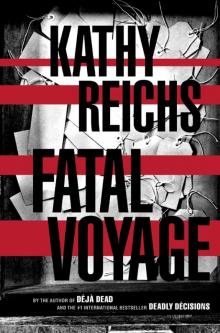 Fatal Voyage
Fatal Voyage 206 Bones
206 Bones Bones to Ashes
Bones to Ashes Terminal
Terminal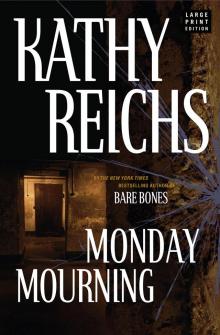 Monday Mourning
Monday Mourning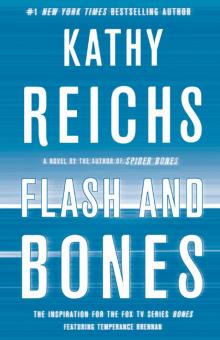 Flash and Bones
Flash and Bones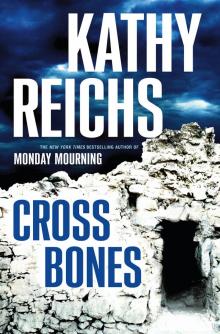 Cross Bones
Cross Bones Devil Bones
Devil Bones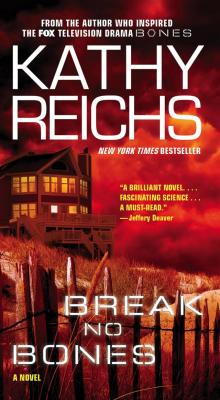 Break No Bones
Break No Bones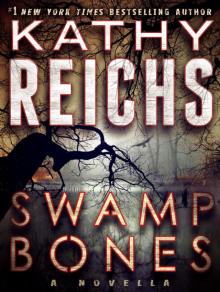 Swamp Bones
Swamp Bones Déjà Dead
Déjà Dead Shock
Shock Spider Bones
Spider Bones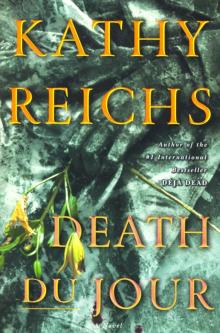 Death Du Jour
Death Du Jour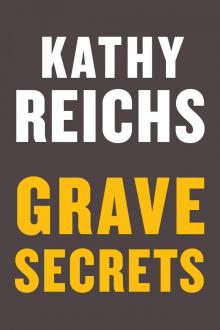 Grave Secrets
Grave Secrets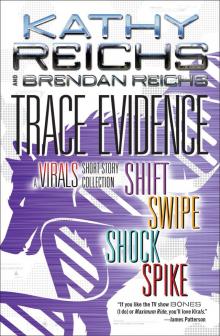 Trace Evidence: A Virals Short Story Collection
Trace Evidence: A Virals Short Story Collection Bones on Ice
Bones on Ice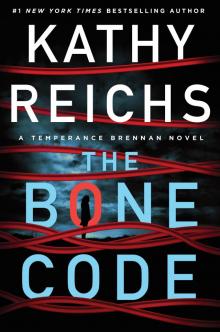 The Bone Code
The Bone Code Bones in Her Pocket
Bones in Her Pocket Seizure:
Seizure: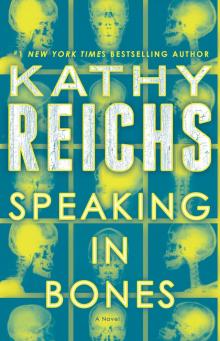 Speaking in Bones
Speaking in Bones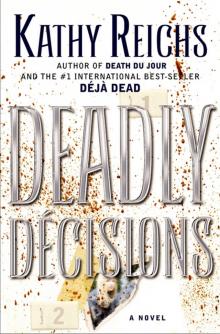 Deadly Decisions
Deadly Decisions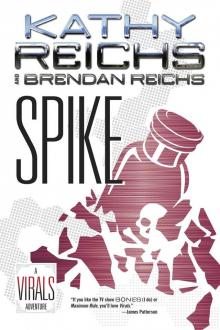 Spike
Spike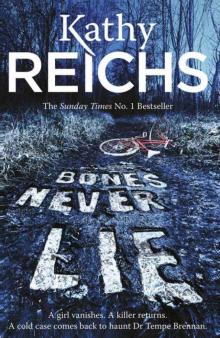 Bones Never Lie
Bones Never Lie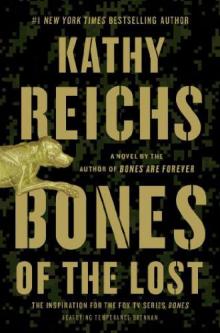 Bones of the Lost
Bones of the Lost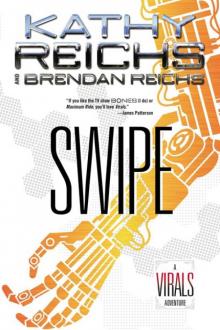 Virals 03.5 - Swipe
Virals 03.5 - Swipe Exposure
Exposure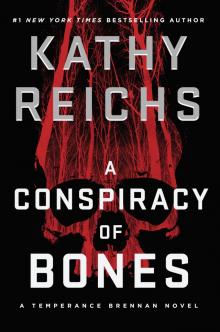 A Conspiracy of Bones
A Conspiracy of Bones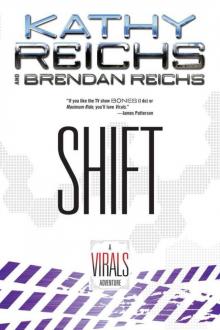 Shift (tory brennan)
Shift (tory brennan) Bones of the Lost: A Temperance Brennan Novel tb-16
Bones of the Lost: A Temperance Brennan Novel tb-16 Virals tb-1
Virals tb-1 Bones Are Forever tb-15
Bones Are Forever tb-15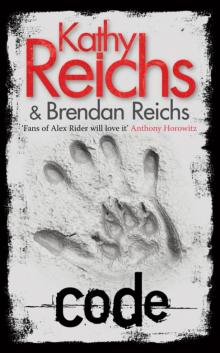 Code tb-3
Code tb-3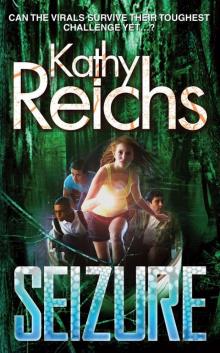 Seizure tb-2
Seizure tb-2 Deadly Descisions
Deadly Descisions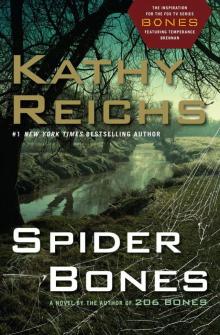 Spider Bones: A Novel
Spider Bones: A Novel